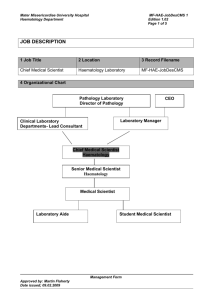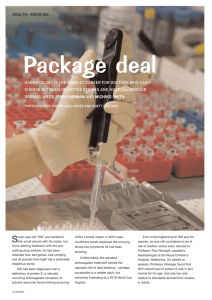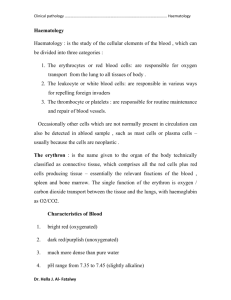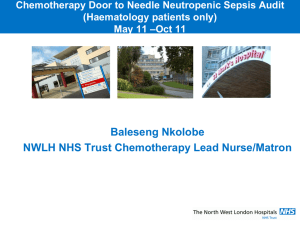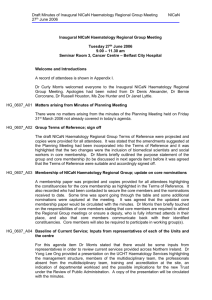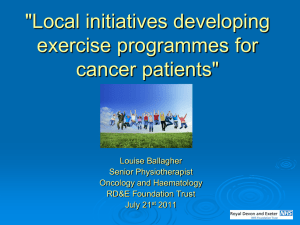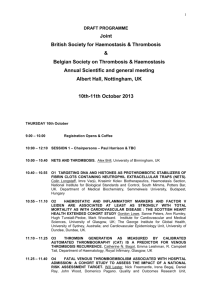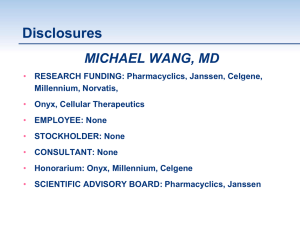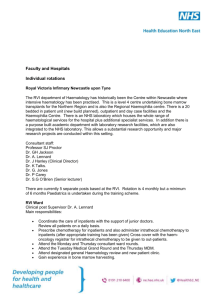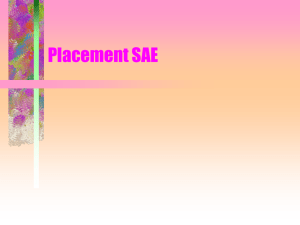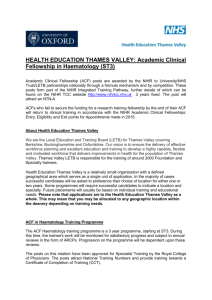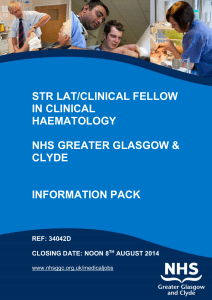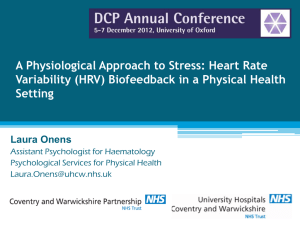Haematology
advertisement
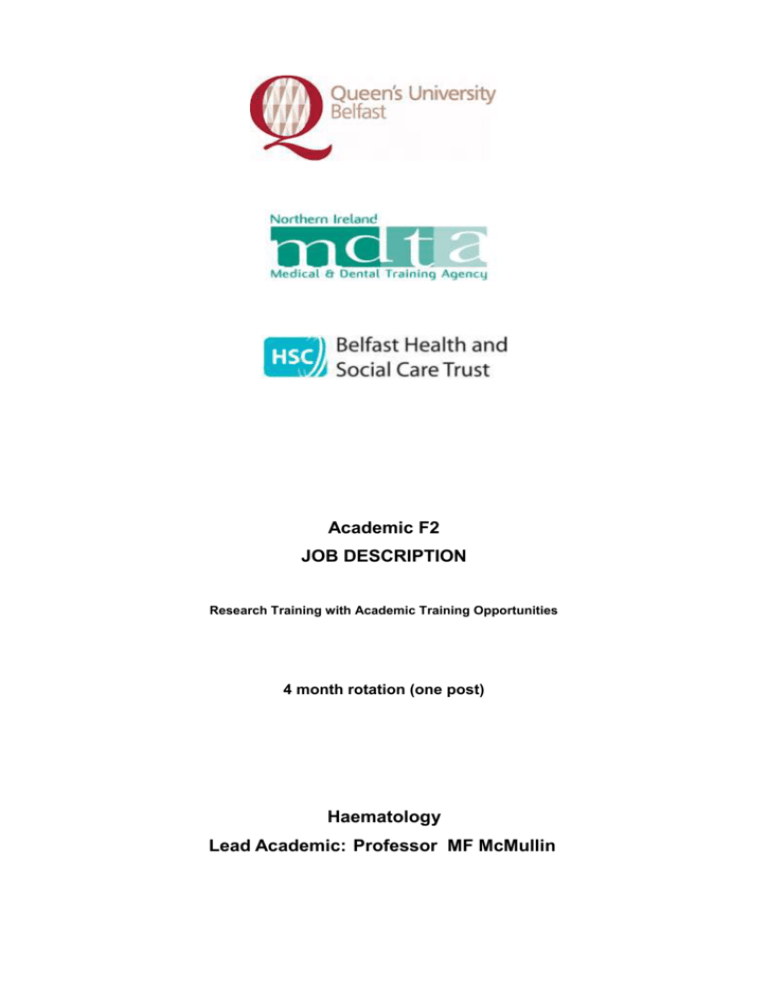
Academic F2 JOB DESCRIPTION Research Training with Academic Training Opportunities 4 month rotation (one post) Haematology Lead Academic: Professor MF McMullin Outline of the post Prior to starting the placement: Following successful application, you are invited to visit the Regional Haematology Centre and to discuss the placement with your Academic Clinical Supervisors. This will help with planning a suitable research project and academic exposure. Generic academic skills: By undertaking an academic F2 placement, you will gain insights into clinical academic medicine through regular interactions with your supervisors, other clinical academics, consultants active in research and education, QUB scientific and educational staff, postgraduate research students and clinical research professionals. This placement is designed to develop your knowledge, skills and aptitudes for academic medicine and to foster interest in a long-term clinical academic career in any discipline. Academic component: The placement will commence with an appraisal meeting with both main supervisors to review your learning portfolio to date and to agree the educational and research objectives for this academic F2 placement. You will receive feedback from your supervisors throughout the 4 month attachment with regular assessment to ensure academic competencies are achieved. Research skills: 1. A research project can be chosen in one of a number of topics relevant to haematological disease. This will be based in the context of one or more clinical trials or translational research studies. The project will be supervised by one or two experienced clinical academics. If possible, the research project could form the basis of an abstract to be submitted to a national meeting. 2. Research training: It is envisaged you will be able to complete a number of research project tasks (learn about the ethical, regulatory and NHS governance issues relevant to clinical academic research; undertake a literature review; interrogate a database; collate laboratory results; practise scientific writing; present data in an abstract, as a poster and/or oral presentation). To assist in this we have planned for academic F2 doctors to work in all the clinical areas for Haematology, in the laboratories based close by in the QUB Centre for Cancer Research and Cell Biology and in the N. Ireland Cancer Clinical Trials Unit. Trainees will assist in current clinical trials and will receive training in the basics of clinical trial and translational research methodology, ethics and governance. 3. Mentorship: You will have access to experienced clinical academic staff in haematology, (Professor Mary Frances McMullin and Dr Robert Cuthbert) and clinical scientists (Professor Ken Mills). All are available to provide longer term advice and encouragement to help you pursue a career in academic medicine. Teaching skills: Haematology has active undergraduate and postgraduate educational opportunities. 1. You will be encouraged to participate in the undergraduate teaching programmes that we run for 2nd, 3rd, and 5th year medical students (seminars, tutorials, lectures, clinic and ward based teaching). This teaching will be directly observed by your academic supervisors with multiple opportunities for feedback to improve both your confidence and competence. 2. Formal postgraduate education includes weekly case and topic based learning, and education on the basic, translational and clinical science base in haematology. These sessions will be held in the Ward 10 North, the haematology laboratory suite, BCH, the Centre for Cancer Research and Cell Biology and the N. Ireland Cancer Clinical Trials Unit. Clinical component: There will be F2 level clinical feedback, appraisal and assessment as documented in the Foundation Programme Curriculum (www.mmc.nhs.uk). You will have particular opportunities to expand your knowledge of management of haematological disease in both the in- and out-patient setting with attendance in wards and at clinics where you will be expected to see new and review patients in both clinical trials and standard care in haematology and oncology. This will provide numerous opportunities suitable for recording F2 competencies in mini-CEX and CBL formats. Tuition will also be provided on appropriate communication with fellow health professionals and patients including construction of dictated letters (an important generic skill). It will also be expected that you will be preparing for and sitting the Part 1 MRCP exam or equivalent during the Academic F2 year. Provisional job plans: These indicative job plans have been designed to introduce the successful candidate to major areas of clinical and academic haematology. There will be individualisation of the attachment for trainees dependent on previous research experience and ultimate career wishes, but neither previous research nor a desire to work with patients with haematological disease long-term are mandatory. There will be desk space and a personal computer for use in the units. Training in library and journal access will be provided in addition to the clinical training on the relevant hospital IT systems pertinent to our practice. HAEMATOLOGY a.m. Monday Tuesday Wednesday Thursday Friday CCRCB laboratory research meeting Acute leukaemia clinic Project work Acute leukaemia MDM Teaching round Trials Meeting Progress meeting Myeloproliferative disorders clinic Clinical skills teaching to 2nd years Project work Grand rounds Haematology Journal club Haematology teaching p.m. Contact Details: Prof M F McMullin, Tel: 02890263733, email: m.mcmullin@qub.ac.uk ACADEMIC TRAINING PATH CCT Medical School Foundation Programme Academic Foundation Year MB Intercalated BSc, MPH, MRes ST1, ST2, ST3 Specialist Training Core Medical Training Academic Status MB/PhD 1 2 Academic Clinical Lectureship Senior Lecturer ACL 3 4 5 F2 Personal Fellowship BSc Academic Clinical Fellowship ACF Clinical Training F1 Academic position Training Fellowship 3 yrs Clinician Scientist Fellowship or Educational Training up to 4 yrs Further specialty / sub-speciality training Senior Clinical Fellowship Graduate Entry Training The timings of personal fellowships are indicative – there should be flexibility according to individual career progression Academic F2: Academic F2 training posts are for 4 months. This will be with two other rotations one of which will be a General Medicine attachment. ACF/ACL: Trainees already appointed at ST3 or above are eligible to apply. Trainees who have undertaken postgraduate research (PhD or MD) should have already submitted their thesis, or be within three months of submission. August 2014
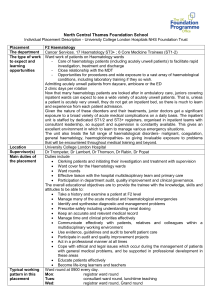
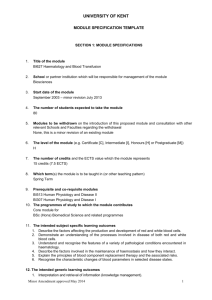
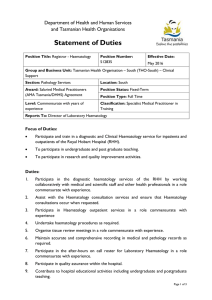
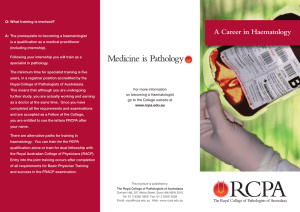
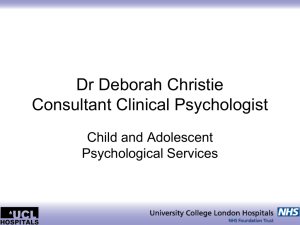
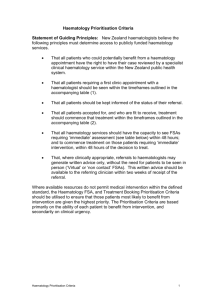
![Curriculum Vitae [1]Personal Data: A](http://s3.studylib.net/store/data/007622316_2-f81dcc8b3c398dc645b2fc6ca885686f-300x300.png)
